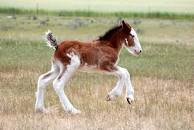There’s foal poop everywhere this time of year. Do probiotics help?

Background
Up to 60% of foals develop diarrhea within 6 months after birth. Preventive measures are limited but potentially probiotics could be used.
Objective
To evaluate the effect of a newly designed probiotic on the incidence of foal diarrhea in a randomized field trial.
Animals
Seventy-two healthy neonatal foals.
Methods
Randomized, placebo-controlled field trial. Foals were administered a placebo or probiotic for 3 weeks and monitored for an additional week. A total of 3 fecal samples were taken from each foal at biweekly intervals. Statistical modeling was applied for comparison of incidence and duration of diarrhea and fecal shedding of Clostridium perfringens and Clostridium difficile between treatment and age groups.
Results
The overall incidence of diarrhea was 41 of 72 (59%) and did not differ (P = 0.37) between treatment groups. Foals treated with probiotics were more likely to develop diarrhea requiring veterinary intervention (P = 0.007). Age had a significant effect on incidence of diarrhea (P < 0.001); foals 8–15 days old having the highest probability of developing diarrhea. Duration of diarrhea and soft feces were not significantly different between groups. The prevalence of C. perfringens shedding was 55% with no difference between treatment groups (P = 0.23). The prevalence of C. difficile shedding was 11%.
Conclusion and Clinical Importance
There was no benefit of administering a 3-week course of probiotics, but potential adverse effects were noted. Whether the probiotics lacked a clinical effect, or the choice of strains or dose was inadequate, is unknown. Clostridial shedding was not influenced by probiotics despite in vitro activity of probiotics.
Click here to be directed to the article in the Journal of Veterinary Internal Medicine.

